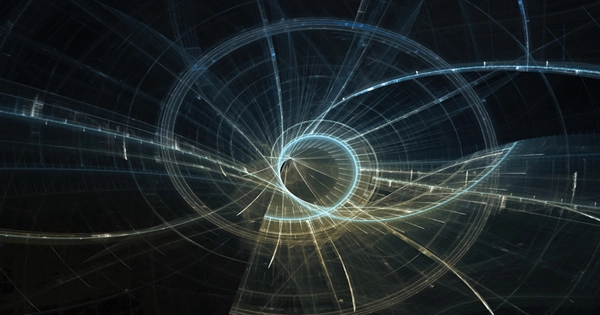A novel method for recognizing gravitational wave signals that uses quantum computing could be a crucial new tool for future astrophysicists.
A team from the University of Glasgow’s School of Physics and Astronomy has devised a quantum algorithm that dramatically reduces the time required to match gravitational wave signals against a massive databank of templates.
This technology, known as matched filtering, is used in some of the gravitational wave signal discoveries made by detectors such as the Laser Interferometer Gravitational Observatory (LIGO) in America and Virgo in Italy.
These detectors, which are the most sensitive ever built, detect the small ripples in spacetime induced by major astronomical events such as the collision and merger of black holes.
Matched filtering helps computers extract gravitational-wave signals from the noise of the detector’s data. It works by filtering through the data and looking for a signal that fits one of potentially hundreds of trillions of templates—pre-created data pieces that are likely to correlate with a real gravitational wave signal.
While the procedure has allowed for several gravitational wave detections since LIGO’s first signal in September 2015, it is time-consuming and resource-intensive.
In a recent paper published in the journal Physical Review Research, the team describes how a quantum computing technique known as Grover’s algorithm could dramatically accelerate the process.
Grover’s algorithm, created in 1996 by computer scientist Lov Grover, uses the exceptional capabilities and applications of quantum theory to speed up the process of searching through databases.
While quantum computers capable of processing data using Grover’s method are still in development, conventional computers can imitate their behavior, allowing researchers to design strategies that can be used when the technology matures and quantum computers are widely available.
The Glasgow team is the first to modify Grover’s algorithm for gravitational wave detection. In the study, they show how they used it to search for gravitational waves using software they created using the Python programming language and Qiskit, a tool for mimicking quantum computing operations.
The team’s technology is capable of increasing the number of operations by a factor proportionate to the square root of the number of templates. Current quantum processors are substantially slower than classical computers at executing simple functions, but as technology advances, their speed is predicted to improve. This reduction in the number of calculations would result in a faster time.
Dr. Scarlett Gao of the University’s School of Physics and Astronomy is one of the paper’s lead authors. “Matched filtering is a problem that Grover’s algorithm is well-placed to help tackle,” said Dr. Gao, “and we’ve been able to design a system that suggests that quantum computing could have useful applications in gravitational-wave astronomy.”
When my co-author and I started this work, we were Ph.D. students, and we were fortunate to have the support of some of the UK’s leading quantum computing and gravitational wave researchers during the development of this software.
While we focused on one sort of search in this study, it is feasible that it may be adapted for other procedures that, like this one, do not require the database to be put into quantum random access memory.”
The paper’s co-lead author is Fergus Hayes, a Ph.D. student at the School of Physics and Astronomy. Researchers in Glasgow has been working on gravitational wave physics for over 50 years, and work in our Institute for Gravitational Research contributed to supporting the development and data analysis sides of LIGO, he added.
“Matched filtering is a problem that Grover’s algorithm seems well-placed to help solve, and we’ve been able to develop a system which shows that quantum computing could have valuable applications in gravitational wave astronomy.
Dr. Gao
“Dr. Gao and I headed a multidisciplinary team that demonstrated the promise of quantum computing in matched filtering.” As quantum computers advance in the next few years, methods like these may be used in future gravitational wave detectors. It’s an intriguing prospect, and we’re looking forward to expanding on this preliminary proof of concept in the future. “
Sijia Gao, Fergus Hayes, Sarah Croke, Chris Messenger, and John Veitch published “A quantum algorithm for gravitational wave matched filtering” in Physical Review Research.
The work was done in collaboration with the entire School of Physics and Astronomy at the University of Glasgow.
The team’s paper, titled “A quantum method for gravitational wave matched filtering,” was published in the journal Physical Review Research. The Science and Technology Facilities Council (STFC) and the Leverhulme Trust provided funding for the study.





